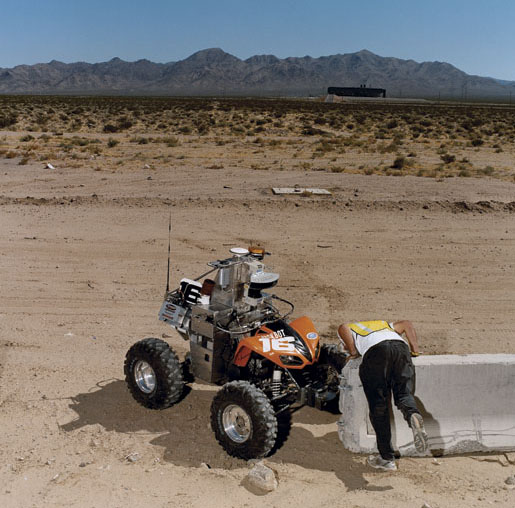Mentioning The Second Machine Age reminded me that the book makes reference to the 2004 Popular Science piece, “Debacle in the Desert,” which reported on the inaugural DARPA Great Challenge, a 142-mile traverse across the Mojave for driverless vehicles. The “winner” completed fewer than 8 miles. It was pure folly. Just six years later, autonomous vehicles were not only easily crossing desolate spaces but being discussed seriously as probable in the near future for busy streets, and by 2014 they’ve racked up tens of thousands of miles of test runs on highways. The progress in just a decade has been astounding, even if they’re still some major obstacles. The opening of Joseph Hooper’s PopSci piece:
“When last we visited with the men and women, the boys and girls, the Red Teams and Blue Teams and Road Warriors of the DARPA Grand Challenge off-road robotics race, back in March, we signed off on a note of authentic ambivalence. The teams themselves were all over the map, from rehearsing victory speeches to praying they would pass the qualifying round and be allowed on to what was anticipated to be a 210-mile course from outside Los Angeles through the Mojave Desert to somewhere just west of Vegas. The race’s organizers, for their part, couldn’t quite muster a consensus on how to handicap the event. Race manager and resident sunny optimist Col. Jose Negron unblinkingly predicted that a team would cross the finish line in under 10 hours to claim DARPA’s million-dollar prize in the race’s inaugural run-yet course designer Sal Fish couldn’t bring himself to share this official vision. ‘It’s still hard to get it in my brain,’ Fish said, ‘that this is all going to happen with robots.’ Chalk one up for Mr. Fish.
Here, to spare you the suspense, is how things looked once the dust had cleared on race day, March 13: Carnegie Mellon University’s Red Team, the presumptive race favorite-in the minds of many race insiders, the only team with a realistic shot at the million-dollar prize-had ended the race at mile 7.4, its Humvee’s belly straddling the outer edge of a drop-off, front wheels spinning freely, on fire. SciAutonics II dropped out of the running at mile 6.7, its Israeli dune buggy stuck in an embankment. Digital Auto Drive quit at mile 6.0, its Toyota Tundra stymied by a football-size rock. The Golem Group stopped at mile 5.2, its pickup stuck on a hill with insufficient throttle to move forward. Team Caltech, another race favorite, dropped out at mile 1.3, its Chevy Tahoe SUV having careened off course and through a fence. Team TerraMax, a heavyweight collaboration between Ohio State University and the Oshkosh Trucking Corporation, was out at mile 1.2, stopped of its own accord, a 32,000-pound six-wheel military truck flummoxed by some bushes. These, it should be noted, were the Grand Challenge success stories. The rest of the field went haywire at or just beyond the starting chute in full view of the press who packed the grandstands erected for the event.”
Tags: Jose Negron, Joseph Hooper, Sal Fish

